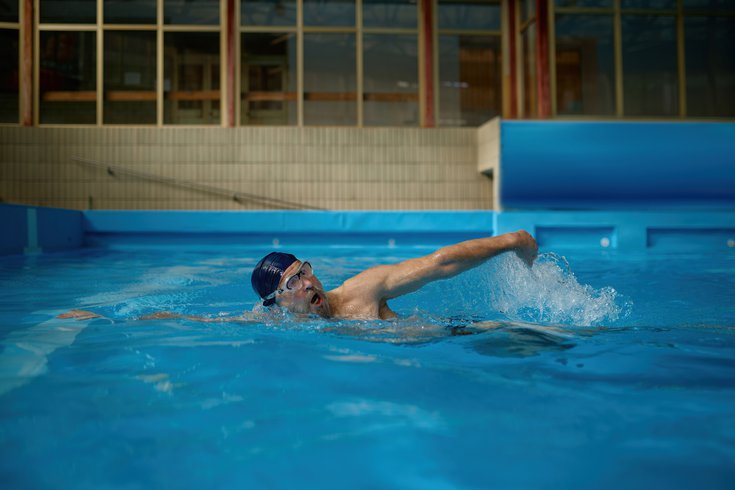
July 28, 2023
 Source/Image licensed from Ingram Image
Source/Image licensed from Ingram Image
New research shows that the risk of depression among adults over age 50 decreases as their exercise levels increase.
Fifty-plus men – and women in this case – considering a healthy lifestyle just got another reason to make the commitment.
There is new research that brings the conversation about depression back to my North Star of healthy living, in this case providing yet another reminder of the enormous benefits of exercise. A 10-year study, published earlier this month, showed that exercise can help reduce the symptoms of chronic depression among adults over 50.
According to the U.S. Centers for Disease Control and Prevention, depression annually affects about 16 million U.S. adults. And though the CDC notes that depression is not a normal part of aging, older adults are at an increased risk for the mental health condition.
This risk, the CDC says, is tied to chronic disease, because depression is more common in people who have other illnesses. Among older adults, 80% have at least one chronic health condition – such as heart disease, diabetes or cancer – and 50% have two or more. Though only a small percentage of older adults are diagnosed with major depression, the percentage is higher among those that are hospitalized or need home health care.
The study, which involved 4,016 Irish adults over 50, including some with chronic health conditions, found that exercise reduced depressive symptoms, with increased levels of exercise associated with greater benefits. When participants met exercise guidelines, their risk of depressive symptoms and major depression dropped 7%. Exceeding the guidelines produced a 16% reduction; the highest amounts of physical activity generated a 23% lower risk.
The results were consistent with previous studies that have found a link between exercise and mental health. They contribute to a growing body of evidence on the benefits of living healthy.
A 2020 analysis of data from a number of independent studies examining the relationship of exercise interventions and the prevention of depression concluded that exercise has a beneficial effect on depressive symptoms across a wide age range within the general population.
Harvard Medical School says that people who engage in 15 minutes of higher-intensity running per day, or an hour of lower-intensity activity (like a walk) reduce their risk of major depression.
According to the Mayo Clinic, the primary factor behind the antidepressant benefits of exercise is the release of feel-good endorphins – natural brain chemicals that heighten the feeling of well-being. The Mayo Clinic also states that exercise can take your mind off the negative thoughts and worries that promote depression. Their takeaway is that exercise represents a positive management of depression, unlike drinking alcohol or hoping that depression will go away on its own, each of which can make matters worse.
Adding to the science has been the recent emergence of cultural breakthroughs in which men of public stature in politics and sports have defied traditional masculine norms and acknowledged their bouts with depression and the importance of recognizing and treating the disease.
The National Institute of Mental Health defines depression as a common but serious mood disorder with severe symptoms that can affect how a person feels and daily activities like sleeping, eating or working. The experts at NIMH indicate that symptoms must be present for at least two weeks to be diagnosed, and that there are several types of depression, but major depressionis a common form that includes symptoms of depressed mood or loss of interest that interfere with daily activities.
Other signs of depression include feelings of hopelessness or pessimism, feelings of irritability, frustration, or restlessness, increased use of alcohol or drugs, isolating from family and friends, and problems with sexual desire and performance. Medical experts say men are more likely to turn to alcohol than women and may see a physician for the physical symptoms but not their emotional state.
So, whether you are battling depression or just want to avoid it, what should you do?
Check out the physical activity guidelines for Americans. Adults should get 150 minutes to 300 minutes a week of moderate-intensity aerobic exercise, or 75 minutes to 150 minutes of vigorous-intensity aerobic physical activity each week – or an equivalent combination of the two. In addition, adults should do muscle-strengthening activities of moderate or greater intensity two or more days a week.
In full transparency, it is only fair to note that the experts tell us that the prevalence of a major depressive episode is higher in women (10.5%) than men (6.2%), and that the prevalence of adults with a major depressive episode is highest among young adults (17%). So, what is the concern? Well, these same experts report that men are four times more likely to die of suicide than women. Though males make up 50% of the population, they represent nearly 80% of suicides.
As I have discussed often in my columns, the male culture remains impacted by an aversion to acknowledge or treat depression. Hopefully, change is afoot, but in the meantime, exercise is available to fight off the disease. No prescription required.
Louis Bezich, senior vice president and chief administrative officer at Cooper University Health Care, is author of "Crack The Code: 10 Proven Secrets that Motivate Healthy Behavior and Inspire Fulfillment in Men Over 50." Read more from Louis on his website.